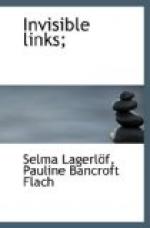Just then a hambo-polska [Note: A Swedish national dance of a very lively character] struck up. The peasant boy was quite beside himself. He thought it sounded like the polska, like the Vaermland polska.
Suddenly Petter Nord was out on the floor. All his fine manners dropped off him. He was no longer at the town-hall ball; he was at home in the barn at the midsummer dance. He came forward, his knees bent, his head drawn down between his shoulders. Without stopping to ask, he threw his arms round a lady’s waist and drew her with him. And then he began to dance the polska.
The girl followed him, half unwillingly, almost dragged. She was not in time; she did not know what kind of a dance it was, but suddenly it went quite of itself. The mystery of the dance was revealed to her. The polska bore her, lifted her; her feet had wings; she felt as light as air. She thought that she was flying.
For the Vaermland polska is the most wonderful dance. It transforms the heavy-footed sons of earth. Without a sound soles an inch thick float over the unplaned barn floor. They whirl about, light as leaves in an autumn wind. It is supple, quick, silent, gliding. Its noble, measured movements set the body free and let it feel itself light, elastic, floating.
While Petter Nord danced the dance of his native land, there was silence in the ball-room. At first people laughed, but then they all recognized that this was dancing. It floated away in even, rapid whirls; it was dancing indeed, if anything.
In the midst of his delirium Petter Nord perceived that round about him reigned a strange silence. He stopped short and passed his hand over his forehead. There was no black barn floor, no leafy walls, no light blue summer night, no merry peasant maiden in the reality he gazed upon. He was ashamed and wished to steal away.
But he was already surrounded, besieged. The young ladies crowded about the shop-boy and cried: “Dance with us; dance with us!”
They wished to learn the polska. They all wished to learn to dance the polska. The ball was turned from its course and became a dancing-school. All said that they had never known before what it was to dance. And Petter Nord was a great man for that evening. He had to dance with all the fine ladies, and they were exceedingly kind to him. He was only a boy, and such a madcap besides. No one could help making a pet of him.
Petter Nord felt that this was happiness. To be the favorite of the ladies, to dare to talk to them, to be in the midst of lights, of movement, to be made much of, to be petted, surely this was happiness.
When the ball was over, he was too happy to think about it. He needed to come home to be able to think over quietly what had happened to him that evening.
Halfvorson was not married, but he had in his house a niece who worked in the office. She was poor and dependent on Halfvorson, but she was quite haughty towards both him and Petter Nord. She had many friends among the more important people of the town and was invited to families where Halfvorson could never come. She and Petter Nord went home from the ball together.




